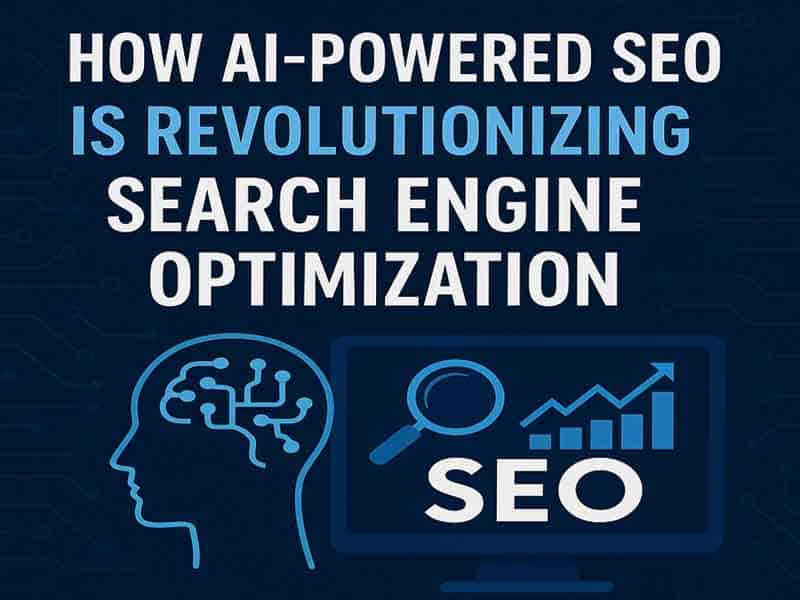The Evolution of SEO in the Age of AI
Search Engine Optimization (SEO) has evolved significantly over the years, shifting away from outdated tactics like keyword stuffing and excessive backlinking. As search engines like Google incorporate artificial intelligence (AI) and machine learning (ML), SEO strategies are becoming more sophisticated. The need for traditional SEO methods has declined. Instead, AI-powered SEO is leading the way, introducing a new era where algorithms are smarter, content is personalized, and optimization tasks are automated.
This comprehensive guide will explore how AI-powered SEO is reshaping the digital marketing landscape, offering actionable insights and strategies to help businesses stay ahead in an algorithm-driven world.
What is AI-Powered SEO?
AI-powered SEO blends cutting-edge technologies like machine learning (ML) and natural language processing (NLP) to optimize websites and improve search rankings. Unlike traditional SEO, which depends on manual tasks, AI handles massive amounts of data in real-time. This allows it to uncover patterns, forecast trends, and offer suggestions that go beyond human capacity.
In short, AI-powered SEO leverages data-driven insights to streamline SEO activities, predict future trends, and create hyper-personalized content for users.
Key Components of AI-Powered SEO
Data-Driven Insights
AI can analyze vast datasets from search results, user behavior, and competitor activities to identify SEO opportunities. It can detect trends, predict traffic surges, and spot gaps in competitors’ strategies.
Example: Tools like BrightEdge use AI to forecast how specific keywords will perform, helping businesses stay ahead.
Content Optimization
AI ensures content aligns with user search intent. Natural language processing (NLP) algorithms optimize content for targeted keywords and related subtopics, enhancing both relevance and quality.
Example: MarketMuse uses AI to ensure content comprehensively addresses related queries, improving its chances to rank for multiple search terms.
Task Automation
AI automates tedious SEO tasks like site audits, rank tracking, and link-building outreach. By automating these tasks, marketers can focus on more strategic aspects of SEO.
Example: Tools like Screpy automate site audits, allowing website owners to quickly address issues like broken links or slow loading speeds.
Predictive Analysis
By analyzing historical data, AI can predict which keywords will trend or which content topics will resonate with users, enabling SEO experts to proactively refine their strategies.
Example: HubSpot used AI to predict emerging keywords, resulting in a 40% increase in organic traffic.
User Experience (UX) Optimization
AI tools track user behavior, identifying pain points such as high bounce rates. These insights are essential for improving user engagement and optimizing conversion rates.
Example: Hotjar, an AI-powered UX tool, provides heatmaps and user journey analytics to optimize website navigation and user experience.
Why AI is Transforming SEO: Key Benefits
Enhanced Content Strategy
AI tools like Clearscope and Frase analyze top-ranking content, helping businesses create SEO-friendly content that aligns with both user intent and search engine algorithms.
Search Intent Decoding: AI categorizes search queries into informational (e.g., “How to use AI for SEO”) or transactional (e.g., “Best AI SEO tools 2025”).
Content Gaps: Tools like Surfer SEO help identify missing subtopics, ensuring content is comprehensive and fully optimized.
Smarter Keyword Research
Platforms like SEMrush and Ahrefs utilize machine learning to recommend keywords with high search intent and traffic potential. AI also predicts keyword difficulty and volume.
Statistic: Websites using AI-powered keyword research see a 2x higher CTR compared to those relying on manual methods.
Task Automation
AI automates SEO processes such as site audits, link-building, and reporting, freeing up valuable time for businesses to focus on strategy and content creation.
Example: DeepCrawl automates site audits, detecting crawl errors and broken pages in minutes.
Personalized User Experiences
AI personalizes content in real-time, adjusting based on user behavior to enhance engagement and reduce bounce rates.
Example: PathFactory uses AI to recommend relevant content to users, leading to a 35% reduction in bounce rates.
Real-Time Adjustments
AI enables businesses to make real-time adjustments to their SEO strategies based on up-to-the-minute data.
Example: Searchmetrics offers real-time strategy adjustments based on trending search queries, such as “voice search optimization.”
How AI Shapes Content Creation & Optimization
AI-Powered Content Creation
AI tools like Jasper and Writesonic produce high-quality drafts, meta descriptions, and video scripts much faster than humans could. While AI cannot fully replicate human creativity, it excels at:
-
Scaling content production (e.g., generating 50 product descriptions in just 10 minutes)
-
Supporting multilingual SEO by maintaining keyword relevance across different languages
Best Practice: Use AI for generating drafts and ideas, then refine the content to ensure it reflects your brand’s voice and expertise.
Optimizing Content for SEO
Semantic SEO: AI tools like INK use contextually related terms to enhance content relevance, making it easier for search engines to understand.
Readability: AI tools like Grammarly ensure content is accessible, following readability standards and making it easier for users to engage with.
Practical Steps to Implement AI-Powered SEO
Keyword Research
Start by using AI-powered tools like Ahrefs’ Keyword Explorer to identify keywords that are low-competition but highly impactful.
Generate & Optimize Content
Feed AI-generated drafts into optimization tools like Surfer SEO to ensure the content is optimized for relevant keywords, readability, and structure.
Conduct Technical Audits
Use tools like Sitebulb to run technical audits and fix issues like duplicate content, slow page load speeds, and broken links.
Monitor & Adapt
Set up AI-powered insights in Google Analytics 4 to monitor user behavior, pinpoint performance gaps, and adjust strategies accordingly.
Stay Updated
Follow AI-powered SEO thought leaders, such as Lily Ray, and attend webinars hosted by platforms like Botify to stay on top of the latest developments.
Conclusion: The Future of SEO is AI-Driven
AI is no longer just a luxury for SEO—it’s essential. By automating repetitive tasks, predicting trends, and delivering hyper-personalized experiences, AI is reshaping how businesses approach SEO. However, human oversight remains critical to ensuring content remains emotionally resonant and ethically sound.


